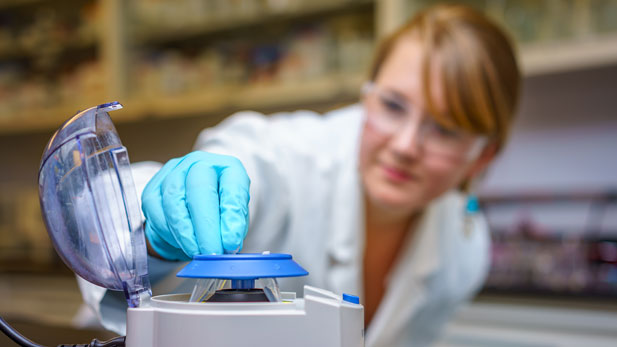Students Engineering Bacteria to Signal Critical Vitamin Deficiencies

Rose-Hulman’s iGEM team is working to reduce birth defects by designing a biological warning sign for vitamin deficiencies in women.
It’s easy to take getting the right vitamins for granted. Most breakfast cereals in the U.S. are packed with vitamins. But in developing countries, getting a healthy diet can be much more difficult. In the case of vitamins B9 and B12, a shortfall in pregnant women can result in serious birth defects, including spina bifida and anencephaly. That’s a problem a synthetic biology team at Rose-Hulman is working to alleviate.
The multidisciplinary team is engineering the DNA of e.coli bacteria so that it will show when a woman is deficient in B9 or B12. If adopted and commercialized, their method would allow women to check for these deficiencies using a simple urine test, as opposed to much more expensive and infrastructure-intensive blood tests currently used.
“In some parts of the world, women don’t even know they are deficient in these vitamins. We’re giving them a way to test it out,” says Audrey Brand, a junior optical engineering major and member of the team, which is entered in the 2017 International Genetically Engineered Machine (iGEM) competition.
If successful, their work could signal a big advance in global infant and women’s health, and allow women to test for vitamin deficiencies in the privacy of their own homes. The research could also pave the way for similar tests for other vitamin deficiencies.
“That’s the way with the best research; it can do more than you think it can,” says Alli Harpel, a sophomore chemical engineering major on the team.
iGEM, which was started in 2003 at the Massachusetts Institute of Technology, is the world’s premier synthetic biology competition for students from high school through graduate school. Attracting teams from around the world, the annual event promotes the development of new genetically engineered DNA sequences, adding to iGEM’s growing repository of functioning biological parts.
Currently, iGEM’s catalog of standardized biological systems numbers more than 20,000. Standardization and duplication of such systems is seen as critical for the growth and success of future genetic engineering.
“iGEM is very much a research competition designed to advance synthetic biology,” says Paul Earhart, a senior computer engineering major also part of the Rose-Hulman team. “Synthetic biology is in a transition phase from science to engineering.”
Students competing in iGEM are expected to take their findings on the road, making presentations about synthetic biology in their communities. The Rose-Hulman team has conducted several public DNA workshops for school-age children across west-central Indiana and east-central Illinois, including at the College for Kids program at Lincoln Trail College and a summer program at the Terre Haute Children’s Museum. They will take their completed project to the iGEM Jamboree in Boston, November 9-13.
Other members of the Rose-Hulman 2017 iGEM team include Madison Muncie, a junior biochemistry major, Julia Walsh, a biomedical engineering major and Yifei Yang, a sophomore chemical engineering major.